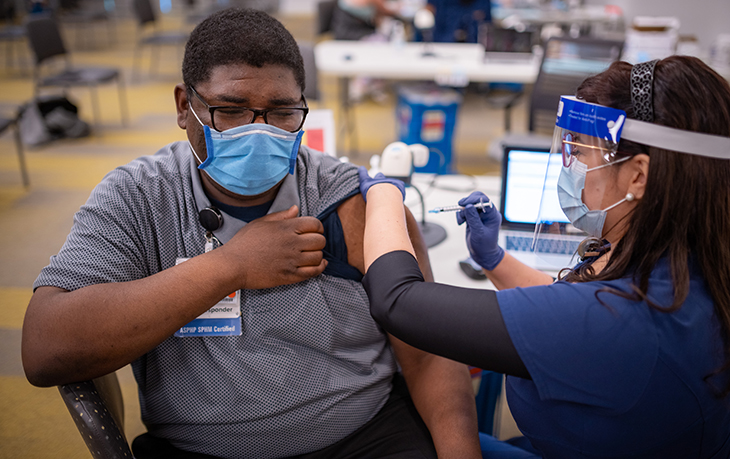Twindemic warning: COVID-19 and flu season will collide this winter
Winter is coming. And so is the “twindemic” – a wave of influenza (flu) and a Delta variant-fueled surge of COVID-19, which are set to strike at the same time.
We asked Dean Blumberg, chief of pediatric infectious diseases at UC Davis Children’s Hospital, for his advice on how we can keep ourselves safe and healthy through the season.
Will this year’s flu season be different from last year’s flu season?
Last year, people were worried about a bad flu season on top of COVID, and it didn't happen because everybody was masking and social distancing. Many things were still closed because of lockdowns.
We had historically low rates of influenza and other respiratory virus transmission last year.
In fact, here at UC Davis Medical Center, we didn't have anybody admitted for influenza last year. In a normal year, somewhere between 40 and 150 kids die from influenza in the U.S., but last year, one child died from influenza. That just shows you how much the masking and social distancing really helped.
This year, things are much more open and we are already seeing the transmission of respiratory viruses like influenza in the community. So it's not going to be the same. People have lost a year in terms of being exposed to influenza and developing some sort of protective immunity.
We do expect a return to a more normal influenza season this year. It might be even worse because people have not been exposed to influenza recently. So I would really encourage everybody to get vaccinated for influenza this year.
What do you expect winter will look like for COVID-19?
For COVID, the models suggest that we are starting to plateau from the recent surge in California and the U.S. But the models also suggest that sometime around December, we're going to see an increase in the number of cases because coronaviruses traditionally are transmitted more in the winter.
They are a winter respiratory virus. The temperature and humidity favor their viral survival and that's why they are transmitted more in the winter.
That's what we're worried about: influenza increasing on top of COVID increasing because Delta is such a transmissible strain.
What are the symptoms of COVID versus flu?
COVID and the flu are very similar at the beginning. They both start with upper respiratory symptoms: cough, runny nose, fever, maybe sore throat.
Where they differ is that COVID tends to be more severe than flu.
COVID can, especially in unvaccinated individuals, cause lower respiratory tract disease. It can go to the lungs and cause pneumonia and this can result in shortness of breath that's much more common with COVID than the flu.
COVID tends to cause a loss of taste and smell more often than influenza. It may happen with influenza, but not as much as with COVID.

This winter, it is even more important to be vaccinated against flu and COVID-19.
How important is getting the flu shot this year?
I think it is important. We didn't have much influenza circulating last year. Usually you get some immunity that builds from year to year and some immunologic memory of the previous strains that were circulating which help you fight off future infections.
We know that the influenza vaccine is recommended. It's good but doesn't always match 100% the circulating strains. So prior immunity is important also and we really missed out on that.
It’s great that we missed out on that because we didn't have much circulating flu last year, but the downside is our immune systems may not be as strengthened, or as trained, to respond to flu infection in the upcoming year.
What are the types of flu vaccines available this season?
Well, we have all of the types that were available before. We've got the inactivated vaccines, the ones that are injected. We also have the live nasal spray vaccine.
One thing that's different this year is that all the available vaccines are quadrivalent. They contain two A strains and two B strains.
That is something that I looked for in the past. Sometimes there were quadrivalent and trivalent vaccines, and if I'm getting a shot I might as well get immunity to four strains rather than three. This year, all of them are quadrivalent.
Also for people over 65 years of age, there are specialized vaccines, ones with adjuvants that help rev up the immune system and give a better immune response. There’s the high dose vaccine and others that may be recommended for that age group.
Can people get the COVID vaccine (or the COVID booster) at the same time as a flu shot?
The CDC is recommending that you can get the COVID vaccine and influenza vaccine simultaneously, or you can get them separated by any interval that you would like. The recommendation is to have the injections at separate sites. Generally that's going to be one in each arm if you get them simultaneously.
Is there anyone who should consider spacing them out?
I think people who are concerned about the side effects might need an arm available for their work or school, or don't want their dominant arm affected, then maybe they should space it out and get both shots in in the non-dominant arm. That would be one option.
Which shot would you recommend first?
I would pay attention to what's going on in the community. Right now we know that COVID is much more of a danger or much more of a risk than influenza. The priority would be getting the COVID shot.
What is the recommendation about taking pain relievers, either before or after the flu or COVID shot?
For theoretical reasons, it's recommended to take pain relievers afterwards and not before.
That's based on studies with other vaccines in children which suggest that taking any anti-inflammatories, either acetaminophen, ibuprofen or others, can dampen your immune response a bit.
Now, it's not known whether that's clinically significant, but it’s a theoretical concern, so the CDC recommends that people do not take pain relievers beforehand
You can certainly take it after you're vaccinated, and I would encourage people to do that because we don't want people feeling miserable after they're vaccinated.
Is it OK to get a flu shot or the COVID shot if you currently have cold symptoms?
It's OK if you have cold symptoms if they're mild. So for example, let's say you've got like a very low-grade fever of 99 and sniffles and a bit of a cough, you know that's no problem whatsoever.
But if you've got a fever of 103 and you're throwing up and you've got diarrhea and you're just in bed all the time, wait for that to get better before getting vaccinated. That would be my recommendation.
Aside from getting the flu vaccine, what are your other preventive tips for flu?
The other preventive things that you can do:
- Don't be around sick people
- If family members get sick, try to isolate them at home.
- Wash your hands.
- Masking is good because it really helps prevent not only COVID but influenza and other respiratory illnesses.



